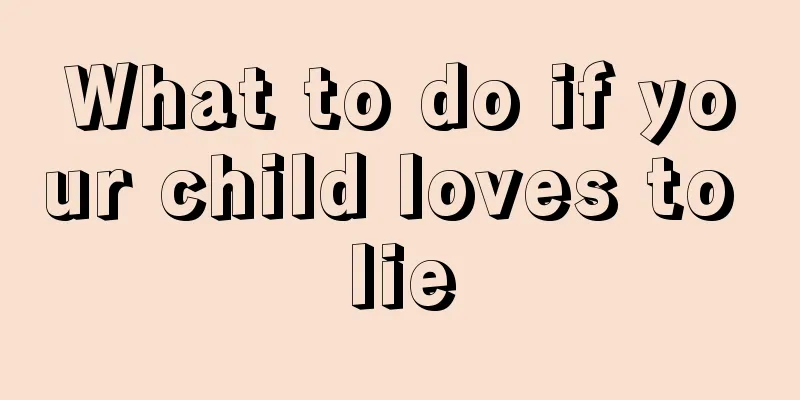Why does my baby have phlegm when breathing?

|
If the baby is feeling unwell, parents should pay attention to the baby's diet and choose simple food so that the food is easy to digest and will not burden the baby's body. Babies can add complementary foods when they are 4 months old. Parents should pay attention to this. What if the baby has phlegm when breathing? If this happens when the baby is breathing, the baby should be sent to the hospital for examination immediately. What is the reason for the baby's phlegm sound when breathing? The possibility of "congenital laryngeal cartilage dysplasia" should be considered. The name sounds scary, but to put it simply, the laryngeal cartilage has not yet "grown strong", and when you need to breathe hard, "the sound made by air passing through the throat" is more common when you exert force. Most of them will improve naturally with age. So what is congenital laryngeal dysplasia? Congenital laryngeal chondrodysplasia is one of the most common diseases in pediatrics. The honking in infants and young children caused by weak and relaxed laryngeal tissues, collapse of tissues during inhalation, and shrinkage of the laryngeal cavity is called congenital honking, also known as laryngeal cartilage softening. It often occurs shortly after birth. As the child grows older, the laryngeal cartilage gradually develops and the hoarseness gradually disappears. Due to malnutrition during pregnancy and calcium deficiency in the fetus, the laryngeal cartilage becomes weak, and the negative pressure increases during inhalation, causing the two edges of the epiglottic cartilage to curl inward and touch each other. Or the epiglottic cartilage is too large and soft, and the two sides of the aryepiglottic folds approach each other, causing the laryngeal cavity to narrow and vibrate like a valve, resulting in laryngeal sound. Inspiratory arytenoid prolapse is another cause. The phonation in this type of child is not caused by weak laryngeal cartilages, but rather by the fact that the arytenoid cartilages rotate forward and downward during inhalation, and the loose tissue on them protrudes toward the front of the glottis, blocking the glottis and causing phonation. The baby's breathing is normal when it is born, but laryngeal stridor gradually develops 1 to 2 months after birth. Most of the symptoms are persistent or intermittent. Laryngolaryngitis occurs only during the inspiratory phase and may be accompanied by inspiratory dyspnea. There are also cases where the laryngeal sound is not obvious at ordinary times, but occurs immediately after the slightest stimulation. Some are related to body position, getting worse when lying on your back and getting better when lying on your stomach or side. The general condition of most children is good and their crying is not hoarse. If the symptoms are not severe, congenital laryngitis can usually heal itself by the age of 2 to 3. Pay attention to preventing cold and fright to avoid respiratory tract infections and laryngeal spasms, which will aggravate laryngeal obstruction. The baby's position can be adjusted. Placing the baby in a side-lying position can alleviate symptoms. Occasionally, severe laryngeal obstruction may require tracheotomy. Acute laryngitis can easily cause breathing difficulties, so special attention should be paid. Treatment: After about one month of birth, only calcium supplements can be taken. Vitamin AD should also be taken at the same time to promote calcium absorption. Congenital striatum must be differentiated from other congenital abnormalities of laryngeal and tracheal development such as laryngeal webs, laryngeal clefts, tracheal cartilage softening, etc. It should also be differentiated from various acquired laryngeal diseases such as inflammation, foreign bodies, trauma, etc. Pediatric experts say that congenital laryngeal dysplasia, also known as congenital laryngeal cartilage softening, can cause abnormal sounds in the throat during breathing, similar to phlegm sounds, which can easily be attributed to pharyngeal infection. Sometimes there is choking on milk or water. When the upper respiratory tract is infected, the sputum sound becomes heavier. Only a few severe cases need to be treated by ENT department, most of them can heal themselves as they age. Generally, significant improvement can be seen before the age of one year. Drug treatment has no significant effect. After understanding why your baby has phlegm sounds when breathing, you must follow the doctor's advice to relieve the phlegm sounds in your baby's breathing. Also, it should be noted that if the problem is serious, the treatment time will be relatively long. This will help relieve the phlegm sounds in your baby's breathing. Parents should know this. |
<<: What to do if your baby always has a runny nose
>>: Why do babies jump when they sleep?
Recommend
Is hernia surgery dangerous for children?
The fastest and most effective way to treat herni...
Why do children have difficulty breathing through their noses?
Some children often have difficulty breathing due...
What is the cause of white spots on children's teeth?
The quality of teeth is a very important matter, ...
How should babies eat iron-rich foods?
Iron is the most abundant essential trace element...
Weekly diet for five-month-old babies
Babies need more care from their parents, and nut...
Why does a 3-year-old child vomit frequently?
A 3-year-old baby's body is still developing ...
What are the causes of indigestion in children?
Indigestion is a phenomenon that many children wi...
Symptoms of asymmetrical baby's buttocks
I believe everyone knows this situation, or even ...
What to do if baby has high jaundice
Every parent hopes that their baby can come into ...
What is the cause of nose bleeding in a two and a half year old baby?
During the growth of children, many parents will ...
The baby hums while feeding
The expression of the baby while feeding is what ...
Baby's vaccinations delayed for 7 months
Babies need to receive different types of vaccine...
Symptoms of rheumatoid arthritis in children
Recently a friend of mine was doing a report focu...
What to do if the baby chokes and milk comes out of the nose
In the process of taking care of the baby, no mat...
At what age does the baby stop eating milk powder?
When the baby is just born, we generally recommen...









